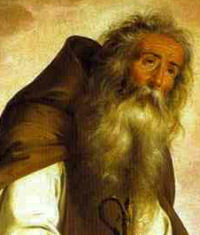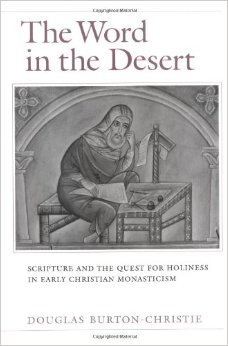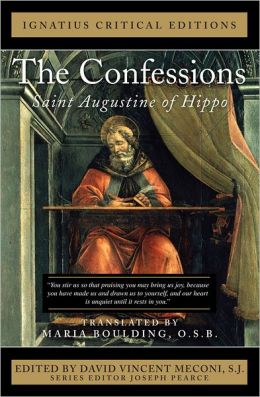 Merry Christmas & Happy New Year!
Merry Christmas & Happy New Year!
Here’s one of my favourite stories about St. Anthony (Antony) of the Desert: “A woman came to Antony and declared that she had endured great fasting and had learned the entire Bible by heart. She wanted to know from Antony what more she should do. Antony was less sanguine about her accomplishments than she was and put a series of questions to her. He asked her, ‘Is contempt the same as honor to you?’ She answer, ‘No.’ He then asked her, ‘Is loss as gain, strangers as your parents, poverty as abundance?’ Again she answered ‘No.’ Antony said to her, ‘Thus you have neither fasted nor learned the Old and New Testament, but you have deceived yourself’” (Douglas Burton-Christie, The Word in the Desert, 161).
This woman wanted to grow but didn’t. One great thing I notice in a lot of people is the desire to grow, especially spiritually, but sometimes we realize we’re not growing. How is it that she read the whole Bible and didn’t get it? St. Anthony is referring to Jesus’ words: “Blessed are you poor… Blessed are you that hunger now… Blessed are you when men hate you” (Lk 6:20-22), but she doesn’t get it; she doesn’t think like Jesus: that these things are blessings.
I’ve met people who tell me they’ve read the Bible. But then I ask myself: what’s the point in reading it if you don’t live it? Matthew Kelly, author of the book we just gave out, Rediscover Catholicism, points out that Jesus commanded us to pray for our enemies. Everyone knows this and everyone acknowledges it as good. But since 9/11, Matthew has never heard a single prayer in our churches for Osama Bin Laden. That’s a sad observation. We know Jesus’ teaching, but don’t live it.
So I’d like to share with you a secret of growth that has made a huge difference in my life, and when I shared this with other people, they loved it. And the secret is: don’t just read, but meditate. I take my cue from our Blessed Mother today in the Gospel: “Mary treasured all these words and pondered them in her heart” (Lk 2:19). When the shepherds go to Bethlehem they find Mary, Joseph and Jesus, and “they made known what had been told them about this child,” and Mary reflected on what they told them. In our life sometimes, for example, when the Gospel is proclaimed at Mass, we may be tempted to think, “Yeah, so?” We hear the words, “A man had two sons…” and we think we’ve heard this before so we tune out. But Mary has a different attitude: she hears what the shepherds tell them, and starts pondering it.
So I’ll just suggest two things:
1) When we’re reading the Bible or some spiritual book, the point is not to finish a book! The book that we gave out, Rediscover Catholicism—many people could read it in a week, but that wouldn’t help us. The point is to integrate it into our prayers and make it a part of us.
Just do this: start reading, and do it very slowly, and, as soon as something hits you, or consoles you, or challenges you, put the book down! And talk to God about it. Ask yourself: why does it it strike you? What’s God saying to you? Is God asking you to change? Follow that grace. After talking to God about, which could last a minute, 15 minutes or 30 minutes, pick the book up again, and don’t read ahead; read the same passage again because God might want to talk to you about it again.
When I read St. Augustine’s Confessions, I usually read three pages in half an hour; that’s one page every ten minutes! But I think I integrated what I was reading and the book changed me.
2) The second thing is applying this idea to how we proclaim the readings during Mass and how we listen to them. From now on, I’d ask all the lectors on Sundays and weekdays to read more slowly, so that one word or one line can hit us and we can reflect on it. The slowness will seem unusual at first. But we want to proclaim these readings in a way that allows the listener to absorb.
When my friend, Fr. Alessandro, and I got sent to New York for theology, some of the New York seminarians complained that he led the Rosary too slowly. I mean, it was slow, even for me! And the guys said, “Do all the Vancouver guys pray that slowly?” And when someone asked him to go faster, he said, “Listen, I’m already speeding up. It’s not going to go any faster.”
Most of the time we don’t even remember what the readings are about because we read them so quickly. We hear, “A reading from the first letter of Paul to the Corinthians,” and then we hear, “The Word of the Lord,” and we’re wondering, “What was the word of the Lord?” Today, does anyone remember what the first reading was about? What book of the Bible it’s from? What about the second reading?
And after the readings, the Church asks us to have a moment of silence. We’re going to take a long pause, 20-30 seconds, according to what the diocese has asked for in 2012. After the first reading, the lector should just pause for 30 seconds until starting the Psalm. After the second reading, I’d ask the choir to pause for 30 seconds before we start the Alleluia. If we take 30 seconds after the first and second readings and then after the homily, we’re only adding a minute and a half to our time at Mass, but that’s a good use of time.
Without pauses and proclaiming slowly, we’ll be like the woman who never understood the Bible. I think it was St. Francis of Assisi who just carried with him a copy of the New Testament, not the whole Bible, but just the New Testament. But he lived it. The point isn’t to finish a book. The point is to live it. Don’t just read, meditate!